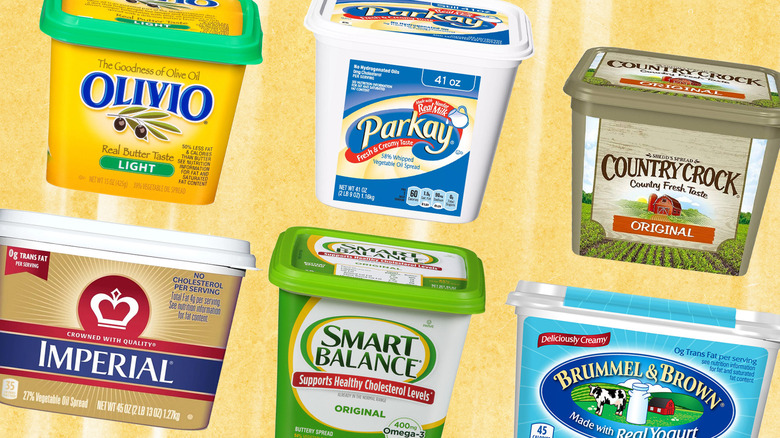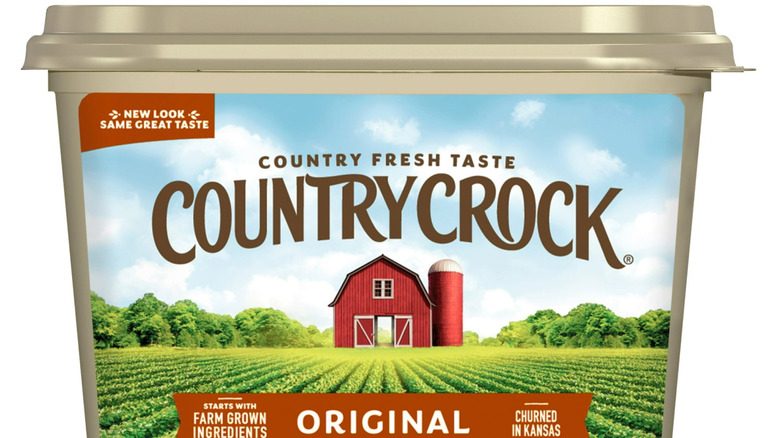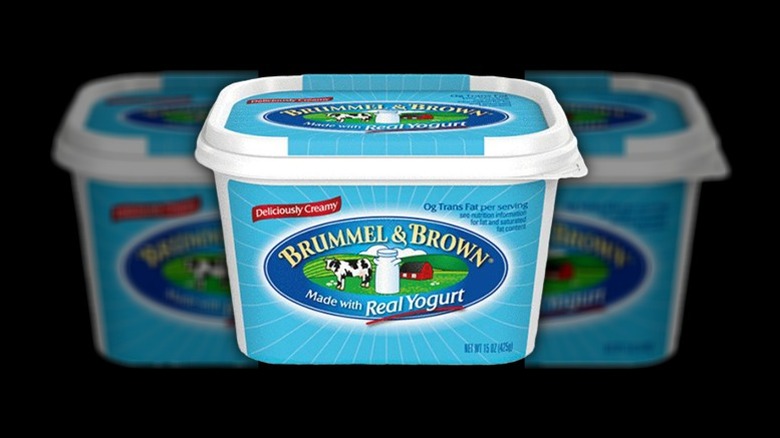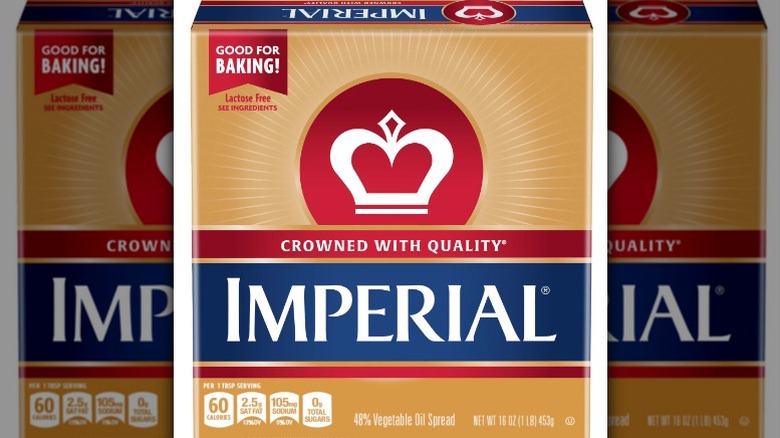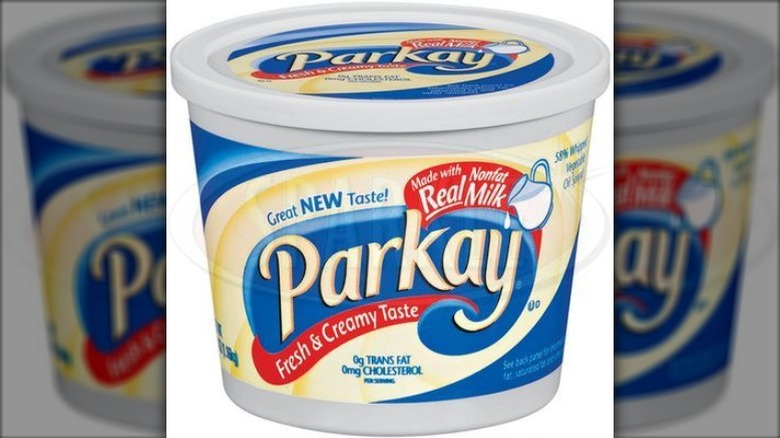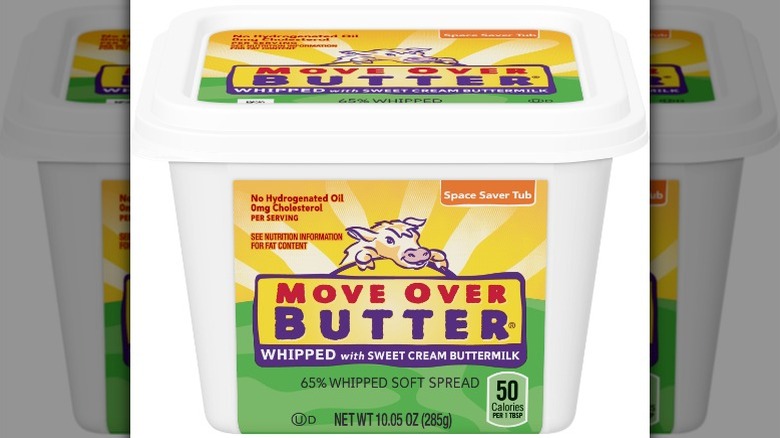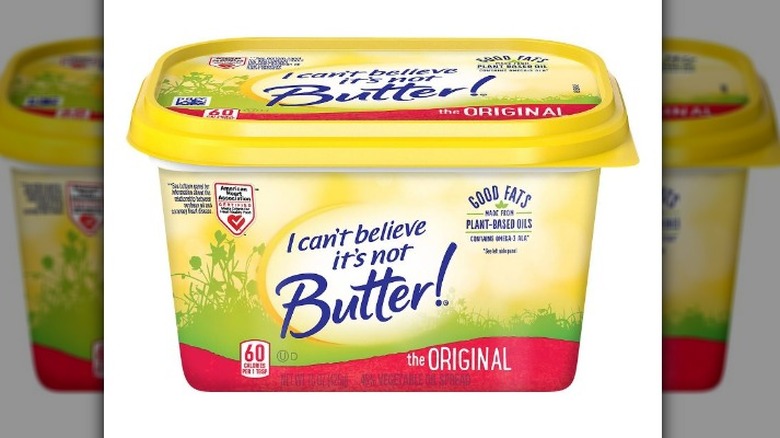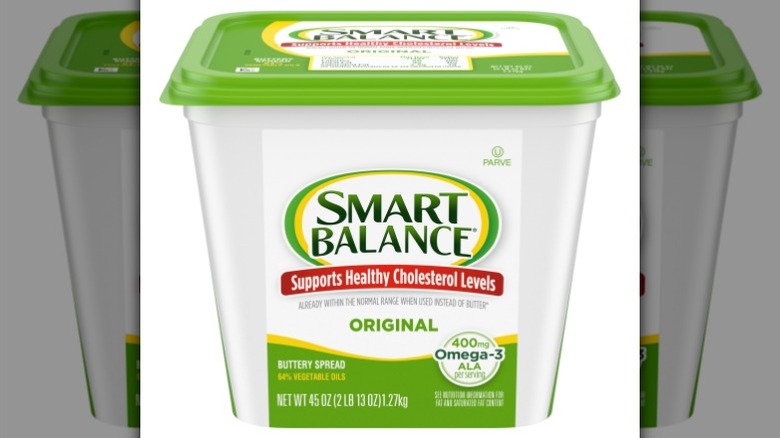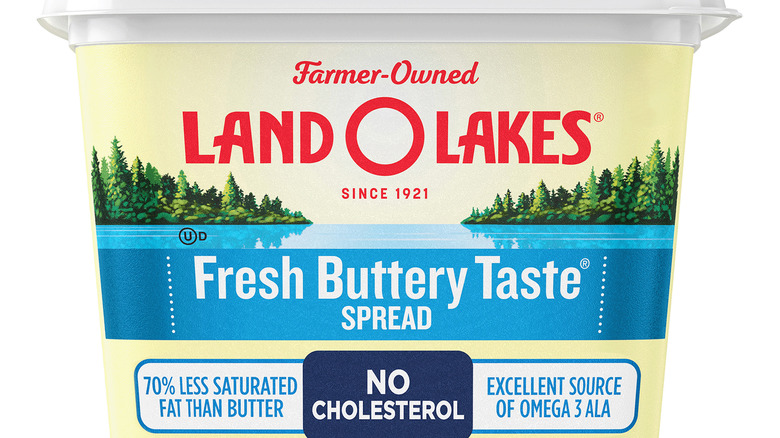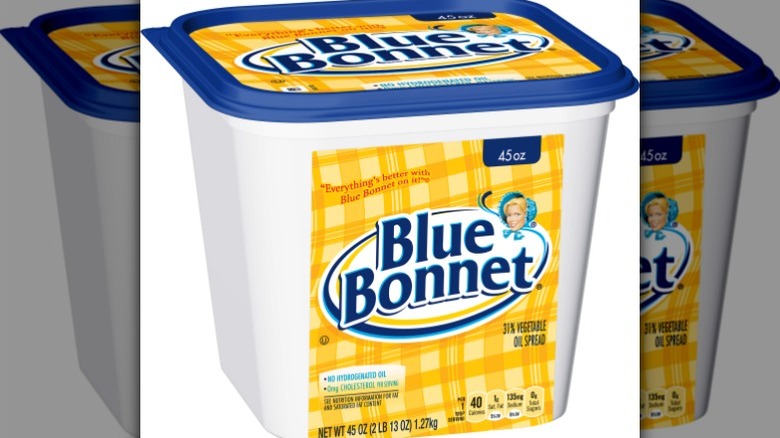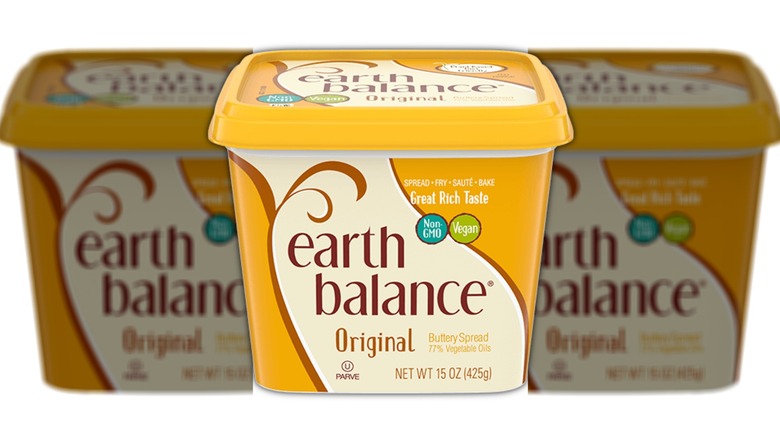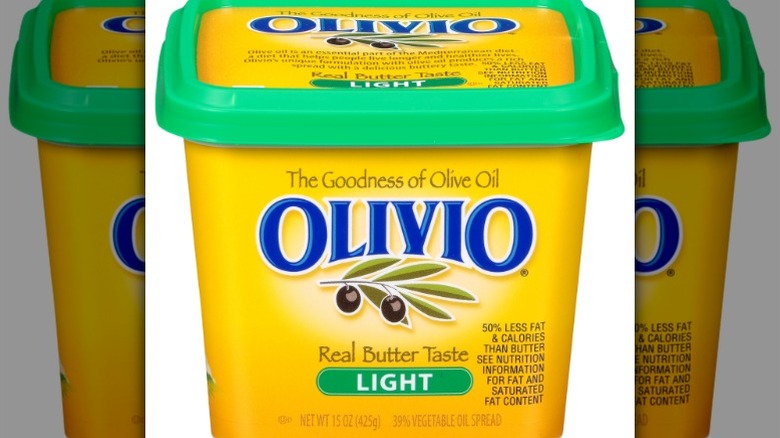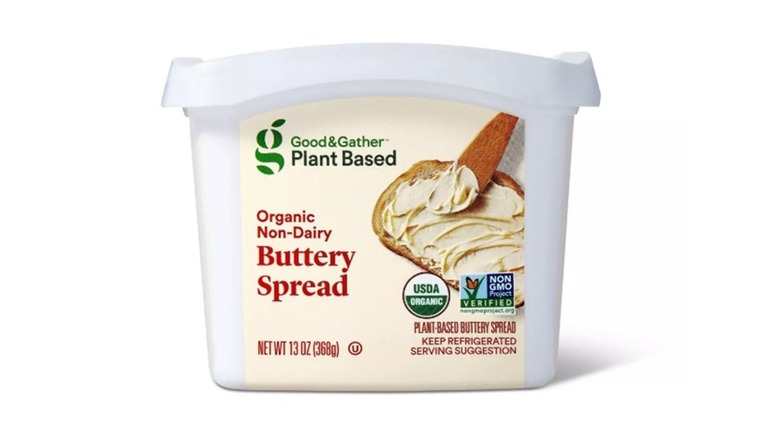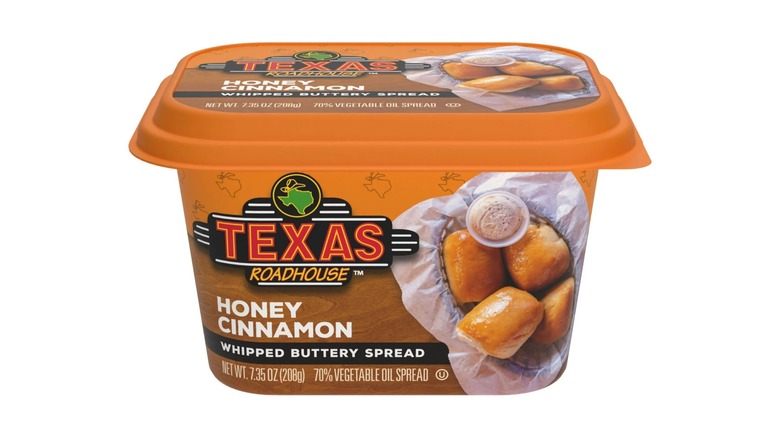'Butter' Brands That Are Made With The Lowest-Quality Ingredients
Butter is a kitchen staple, and when you butter your toast in the morning, you want a product that spreads easily, melts nicely, and has a fabulous buttery taste. Health-conscious consumers, those cutting costs, or people avoiding dairy, may look to butter-substitute spreads for their butter needs. Some butter-like spreads may fool you into thinking they are indeed butter. However, they won't behave like butter when used for baking. The ingredients list can also be a long line of additives and hard-to-pronounce words, the tell-tale sign of a highly processed product.
Butter is commonly used for baking, sauteeing, or just spreading on bread. As you see when you head to the grocery store, there is a myriad of choices. However, some butter brands are of higher quality than others. We've done our best to get to the bottom of what's really hiding in your butter spread. Join us as we take a look at 11 lower-quality brands that perhaps, are best avoided.
1. Country Crock
Country Crock has a long history of making butter-flavored spreads. The company, now owned by Upfield, has been offering margarine spreads since 1945, and was formerly known as Shedd's Spreads. Today, the company says it has been "slow-churning" spreads in Kansas for over 30 years. This may lead you to believe Country Crock is slowly churning cream in the fields of Kansas to make butter. However, there is no real butter or dairy product of any kind in Country Crock.
Country Crock Original Spread was stuffed full of preservatives and additives before the company reformulated its recipe in 2015 to what they called a "simpler" and "healthier" recipe. The new flavor didn't go over well with fans and still contained ten ingredients. One Walmart shopper said of the changes, "As with many items, at some point the manufacturer decided to change the formula; most likely to increase profits ... I used to think Country Crock was just as good as real butter spread on a piece of toast or a biscuit. Now it's just flavorless fat."
As for its healthier claims, Country Crock may have fewer additives than its old formula, but it still contains saturated fat and additives such as vitamin A palmitate. Beta carotene (for coloring) and natural flavoring also make an appearance, the latter of which is highly processed and may contain chemicals, and the former unlikely to be produced naturally. Only about 2% of beta carotenes used on the market are.
2. Brummel & Brown
Brummel & Brown markets itself as a "wholesome" product made with real yogurt. While the spread may have some benefits over other products on our list, we're not sure this brand lives up to the hype. Yes, Brummel & Brown Original Spread has only 45 calories and 5 grams of fat per tablespoon (compared to 102 calories and 11.2 grams of fat in real butter), disappointingly, it's a highly processed product.
Ingredients in the spread include palm kernel and palm oil, soybean oil, natural flavors, and other additives. Palm kernel and palm oil are high in saturated fat, and palm oil plantations have contributed to deforestation, while studies published by the University of California – Riverside have linked soybean oil to obesity, diabetes, and neurological conditions. Although we don't have definitive answers at this time, researchers believe, "in all likelihood, it is not healthy for humans."
Reviewers are also complaining the price has become too high for the product and not worth the money, with one from Walmart stating, "Not too long ago, the price was about $2.98. Now, $4.22!! outrageous and not necessary."
3. Imperial
The Imperial brand is easy to find at most grocery stores and is also one of the lower-priced butter spreads. Although it may look like butter sticks, as the packaging states, it's not real butter, but actually 48% oil. It contains ingredients you might expect, such as a vegetable oil blend and water. However, it also contains artificial additives, like distilled monoglycerides, soy lecithin, natural and artificial flavors, potassium sorbate, and calcium disodium EDTA.
As for taste, one reviewer on Reddit believes the brand has changed for the worse, "I have been using imperial margarine since I started baking many years ago, since maybe the '70s. I liked Imperial, but something has been added or taken away from it and it has changed my whole baking experience."
However, the ratings on Influenster are mainly positive, with some appreciating that Imperial is dairy-free, "This vegetable oil spread tastes pretty decent for being a butter substitute. My family prefers to use this because some people in my household are lactose intolerant, so this is a good choice because of that." Despite some positive ratings, we still feel there are too many additives and artificial ingredients to consider this imitation butter high quality.
4. Parkay
Parkay has been available as a butter substitute for Americans for nearly 90 years. First introduced in 1937, it was owned by Kraft Foods until 1995 when Nabisco bought the brand. Today, Parkay is owned by ConAgra Foods, Inc. It's one of the few brands on this list that isn't dairy-free. The ingredients include whey, which is a derivative of milk. Parkay Original vegetable oil spread is a spread containing 58% whipped vegetable oil. It's also available in sticks and a spray.
Parkay contains a vegetable oil blend with unhealthy oils including soybean oil, palm oil, and palm kernel oil. It also contains a long list of artificial ingredients such as mono- and diglycerides, soy lecithin, natural and artificial flavors, and more.
According to Medical News Today, during the manufacturing process, mono- and diglycerides can become contaminated with toxins such as arsenic, lead, and mercury (although in small quantities.) These chemicals also contain small amounts of trans fats, which are banned in the U.S. However, if the amount of trans fats is less than ½ gram per serving, the FDA allows manufacturers to round down and put zero on the package, which is why Parkay appears to have no trans fats.
Even minuscule amounts of trans fat can add up, leading to unhealthy consequences. Ultimately, it's your decision which butter spread you buy, but we think you should be aware of hidden ingredients.
5. Move Over Butter
Like many entries on our list, Move Over Butter contains a large ingredient list full of additives. One red flag ingredient we spotted was "fractionated palm oil." This ingredient is used by manufacturers attempting to avoid using unhealthy partially hydrogenated oils, but fractionated palm oil has a higher amount of saturated fat than regular palm oil. Other additives include a long list of items such as sodium benzoate, phosphoric acid, and mono- and diglycerides.
As for user reviews, Move Over Butter tends to get high ratings and people say they enjoy the butter-like taste, which derives from sweet cream buttermilk that is reconstituted from buttercream powder. As one Walmart reviewer said, it's the "best tasting of all the fakes." Others like it because it's lower priced than real butter, "really good butter and this is the best price in our area." However, taste doesn't always mean high quality (as we know from highly processed fast food), and we can't recommend Move Over Butter based on its dubious ingredients list.
6. I Can't Believe It's Not Butter!
I Can't Believe It's Not Butter! first launched its butter substitute spread in 1981 during the era in American history when people genuinely thought hydrogenated oils were healthy. The brand became a popular butter substitute, and by the 1990s, it added a butter spray. According to the reviews at Target, some people enjoy the taste, while others disagree. One reviewer said the spread "smells like chemicals."
Although I Can't Believe It's Not Butter! contains a non-nutritious blend of oils and the deceiving ingredient, "natural flavor", we have to admit it's a shorter list of ingredients than many of the other products we've found. We did not spot mono- and diglycerides or calcium disodium EDTA anywhere on the package. However, it still contains oils that are high in saturated fat (soybean, palm, and palm kernel oils). It also is cross-contaminated with milk, though no real dairy is included in the ingredient list. Still, though it's not a health food and should be eaten sparingly, this is likely one of the better butter brands on our list.
7. Smart Balance
Now onto Smart Balance, which markets itself as a healthy product containing Omega-3 fatty acids. It also claims on the front of the package that it "supports healthy cholesterol levels." However, when we look at the ingredients list we see some familiar controversial additives, including monoglycerides, natural and artificial flavors, and calcium disodium EDTA. It also contains palm oil in its vegetable oil blend.
Let's take a look at the reviews. A couple of years ago, Smart Balance changed its formula to use a smaller amount of vegetable oil blend. After receiving a large amount of negative feedback from customers, the company announced it would go back to the original formula. But even this change hasn't pleased everyone.
One Walmart shopper recently said, "We have been using and liking this margarine as long as it has been available, and even stuck with it through the changes — until now ... The taste is terrible, and it is too, too soft." Unfortunately for Smart Balance, this reviewer isn't the only one to request that the company returns to its original formula.
8. Land O'Lakes fresh buttery taste spread
When you think of the Land O'Lakes brand, you probably associate it with real butter. Land O'Lakes is a farmer-owned company that has been making dairy products since 1921. However, Land O'Lakes also offers a line of vegetable oil blend butter-like spreads. Its Land O'Lakes fresh buttery taste spread contains a long list of ingredients including soybean oil, palm oil, palm kernel oil, soy lecithin, mono- and diglycerides, and natural and artificial flavors. Because we see mono- and diglycerides, we know the product likely contains a small amount of trans fats.
Beyond the ingredients list, let's take a look at what consumers think of the product. While some reviewers say they enjoy the flavor, not everyone agrees. One Walmart shopper stated, "I absolutely love Land O' Lakes butter – so I thought its 'fresh buttery taste spread' would be great. Ugghhh the flavor is horrible." Overall, our impressions of Land O'Lakes fresh buttery taste spread are that this one may be a product to steer clear of, especially for health-conscious consumers.
9. Blue Bonnet
Blue Bonnet is another entry on our list that has a long history as a butter-like spread in America. Today, it's available in sticks or tub form. Blue Bonnet was once a locally made margarine, and in the 1940s, Standard Brands took over the product and launched Blue Bonnet spreads nationwide. As part of its marketing campaign, Blue Bonnet hired a model to be its "Miss Blue Bonnet." Jeni Freeland (Berry) won the contest and her image still appears on the package today.
Although Blue Bonnet is known as an iconic American brand, it doesn't mean it's a nutritious or wholesome product. Like some of the other problematic spreads on our list, Blue Bonnet vegetable oil spread contains additives such as maltodextrin, monoglycerides, calcium disodium EDTA, and the unhealthy vegetable blend of soybean, palm oil, and palm kernel oil. As for reviews, while many people like the brand for its lower prices, this is a case of getting what you pay for.
10. Earth Balance original natural buttery spread
Like a few of our other entries, Earth Balance original natural buttery spread is marketed as a healthy and wholesome product. Yes, it's true, Earth Balance does contain some cooking oils known to be better on the, like canola oil, olive oil, and flaxseed oil. But it also includes problematic palm and soybean oils. Furthermore, people looking for lower calorie and fat counts compared with butter will be disappointed in this product. At 100 calories and 11 grams of fat per serving, Earth Balance spread has about the same calories and fat as butter.
Earth Balance has suffered from recent negative reviews with some stating the product has changed for the worse. A Walmart reviewer said, "Unfortunately it appears the company has changed the product. It's not even palatable. It's actually terrible." Not only do they claim to have had a very disappointing piece of buttered toast, but the reviewer's discontent even spread to the rest of the family. In addition to this family, vegan bakers have reported that the butter spread gives off a rancid flavor indicative of its more processed ingredients. All in all, this is a butter brand you might want to steer clear of.
11. Olivio
With a name like Olivio, this product sounds like it should be a healthier alternative to regular butter or even many of the margarine spreads comprising our list. However, when we examined the ingredients list, we found this brand falls short and is actually just another highly processed butter substitute spread. Olivio light butter spread has many of the problematic ingredients found in other spreads on the list such as monoglycerides, calcium disodium EDTA, and artificial flavors, to name a few.
Additionally, Olivio light butter spread contains water as the first ingredient. In a process called skimpflation, (another form of shrinkflation) companies will substitute water for some of the oil. This way, they can cut costs while still charging the same amount for a cheaper product. And finally, when we examined reviews, we found one consumer stating the spread doesn't melt properly, "will not even melt on hot toast or waffles. Just sits on top all stiff unappealing foam-like. How do they sell this stuff?"
12. Good & Gather Plant Based Buttery Spread
Target tries its best to capture the dollars of butter and margarine shepherds by presenting Good & Gather Plant Based Buttery Spread. This dairy-free facsimile does all it can to replicate the essence of bigger names while getting good and greasy over everything from baked potatoes to homemade pancakes, but that doesn't mean the ingredients are particularly good for you. In fact, some of the ingredients should give you cause for pause and make you think twice about how much you really need so-called buttery spread soaking into your favorite dishes.
Out of fairness, it should be clear that everything on the label is listed as organic, which is bound to be a big draw for the clean eaters hoping to avoid dodgy pesticides and herbicides in their dietary design. But there are five — count 'em, five — oils involved in conjuring this close-to-butter-but-not-really spread: palm, coconut, sunflower, flax, and canola. All of these are oils you could find in the cooking oil section of the grocery store individually, but having a pile-up of five in a single swipe of spread is a lot of different oils that can have a lot of different effects on your physiology. Questions about whether coconut oil is as beneficial as you might have heard plague the ingredient, and palm oil is a known environment-crusher. Even organic plant-based ingredients can't overcome pitfalls like this.
13. Texas Roadhouse Honey Cinnamon Butter Spread
Isn't it great to know that you can enjoy the sweet and spicy flavor of Texas Roadhouse Honey Cinnamon Butter Spread in your own home? It might seem that way until you realize how loaded with undesirable elements this butter replicant is. If you were expecting anything close to butter, you might want to take a beat and steel yourself for what's really waiting for you under the lid of this dastardly dairy imitation. The bigger surprises is that this is the same form of spread used in the restaurant, which means you're not getting real butter there either. It's enough to make you question the Matrix-like reality of those deviously delicious Texas Roadhouse rolls this butter in name only is made to rest upon.
There's no red- or blue-pilling in this scenario, just a peek at the verbiage on the back of the container to reveal the sad truth about this not-so-butter-like buttery spread. Three different oils converge to make this meltable topping, including two types of palm oil ... you know, the stuff compromising the rainforest thanks to its ability to create solids out of liquids in everything from peanut butter to shampoo. It does the job it was harvested for in this tub too, but that ends up being a strike against both the planet and your dedication to environmental responsibility. No butter spread is worth sacrificing an entire ecosystem.
Methodology
To determine our list of low-quality butter brands, we looked at products marketed as buttery-tasting spreads. We carefully examined the ingredients list paying close attention to additives and the type of oils used. We also took into account consumer reviews. Although some of the products we chose may have had high marks for taste, the long list of additives and artificial ingredients caused them to wind up on our list. We know you may not agree with all of our choices, but we hope you can take the information provided here to help you make your own choices at the supermarket.
